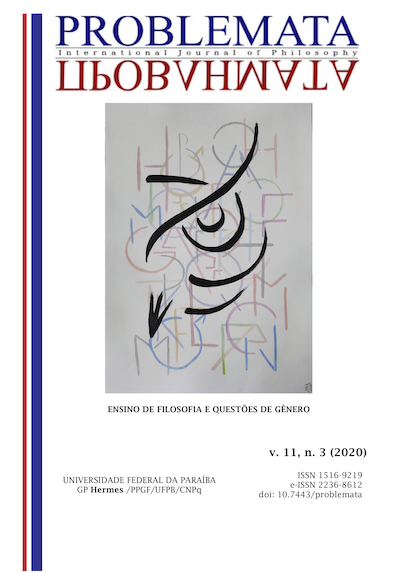Philosophy´s teaching in the face of prejudice and exclusion and women in the philosophical Corpus
DOI:
https://doi.org/10.7443/problemata.v11i3.53845Keywords:
Challenges, Exclusion, Philosophy, Woman, PrejudiceAbstract
The history of Western philosophical thought is masculinized, which makes it clear that philosophy has or may have an ideological character (ideological in the sense of concealing illegitimate power relations) but may also possess an emancipatory potential that lies in its critical force. Once rejected and even marginalized today, one notices a fierce effort by women's intellect to free themselves from the bonds imposed on them by traditional moral education and religion. The woman feels that the time has come to free herself from captivity, to get out of the cave, that is to say, from confinement, from forgetfulness and silencing and to dare to think for herself, embodying the possibility of recovering her experiences, ideas and knowledge. This process involves the constitution of a non-sexist philosophical corpus, the identification of philosophers, the inclusion of feminine intellectual productions in works and curricula that allow the existence of internal debates that show the strength of feminine thought in the scope of philosophy, a thought that already generates its own theories that debate among itself.
Downloads
References
CHAUÍ, Marilene. Cultura e democracia: o discurso competente e outras falas. 5ª Ed., Ed. Cortez, São Paulo, 1990.
COÊLHO, Ildeu M. Filosofia e Educação, In PEIXOTO, Adão (Org.) Filosofia, Educação e Cidadania, Campinas: Editora Alínea, 2002, p 19-70.
BEAUVOIR, Simone de. O segundo Sexo: a experiência vivida. Vol.I, Rio de Janeiro, Editora Nova Fronteira, 2000.
BERNARDES, Maria Thereza Caiuby Crescenti. Mulheres de Ontem? São Paulo, Editora, T. A. Queiroz, 1989.
BOURDIEU, Pierre. Escritos de educação. Petrópolis, Editora Vozes, 2000.
HAHNER, June E. A mulher Brasileira e suas lutas sociais e políticas: 1850-1937. São Paulo, Editora Brasiliense, 1981
HORN, Geraldo Balduíno. Filosofia, Ensino e Emancipação, In: CANDIDO, Celso, CARBONARA, Vanderlei, (Org.) Colecção Filosofia e Ensino: Um Dialogo Transdisciplinar, Editora Unijuí, Numero 5, Rio Grande do Sul, 2004, p. 269-281
MENEZES, Magali Mendes de. Da academia da razão à academia do corpo. In As Mulheres e a Filosofia. TIBURI, Márcia; Menezes, Magali de; EGGERT, Elda (org.) Editora Unisinos: São Leopoldo, 2002. 172p
PAZ, Octavio. O Labirinto da Solidão e Post. Scriptum. Rio de Janeiro, Editora Paz e Terra, 1984.
PERROT, Michelle. Sair. In: PERROT, Michelle; DUBY, Georges (Dir.) História das mulheres no ocidente: o século XIX. Porto, Editora Afrontamento, 1991. V4, p 503-540.
PRIORI, Mary del . Ao Sul do Corpo-Condição feminina, maternidade e mentalidades no Brasil Colônia. Rio de Janeiro, Editora José Olympio, 1995.
PULEO, H. Alicia. Filosofia e Gênero: da memória do passado ao projecto do futuro. Caderno nº 8 da Coord. Espec. da Mulher: Políticas Públicas e Igualdade do Gênero, Prefeitura de São Paulo, 2004.
ROSA, Graziela Rinaldi da. As Relações de Género na Filosofia: Vivências e Narrativas De Professoras De Filosofia. São Leopoldo, 2006 (Dissertação do Mestrado, Universidade do Vale do Rio dos Sinos, Programa de Pós-Graduação em Educação, São Leopoldo, RA, 2006.).
ROSA, Graziela Rinaldi da. Transgressão e moralidade na formação de uma “matrona esclarecida”: contradições na Filosofia de Educação nisiana. São Leopoldo, 2012 (Tese de doutorado, Universidade do Vale do Rio dos Sinos, Programa de Pós-Graduação em Educação, São Leopoldo, RA, 2012.).
Downloads
Published
Issue
Section
License
Authors who publish with this journal agree to the following terms:
- Authors retain copyright and grant the journal right of first publication with the work simultaneously licensed under a Creative Commons Attribution License that allows others to share the work with an acknowledgement of the work's authorship and initial publication in this journal.
- Authors are able to enter into separate, additional contractual arrangements for the non-exclusive distribution of the journal's published version of the work (e.g., post it to an institutional repository or publish it in a book), with an acknowledgement of its initial publication in this journal.
-
- Authors are permitted and encouraged to post their work online (e.g., in institutional repositories or on their website) prior to and during the submission process, as it can lead to productive exchanges, as well as earlier and greater citation of published work (See The Effect of Open Access).





